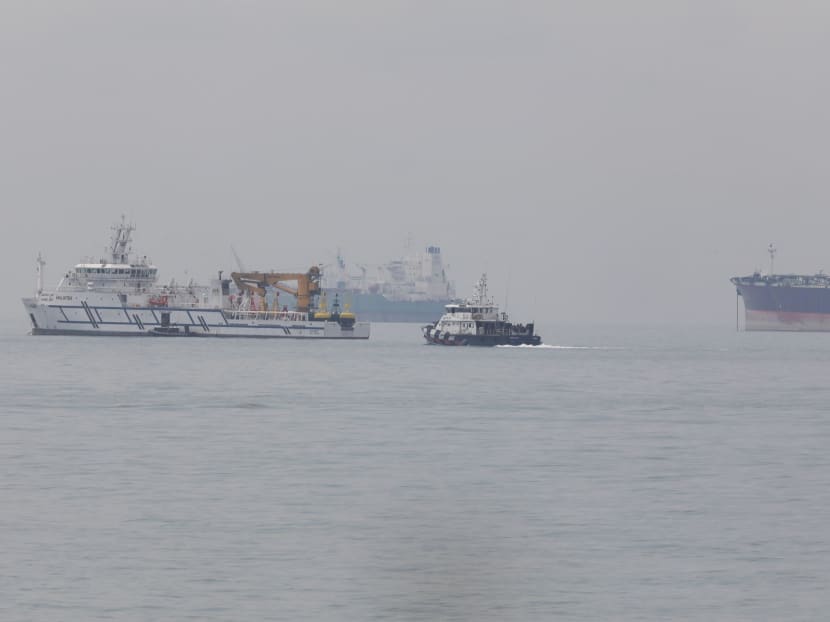Malaysia and Singapore agree to revert to original port limits
PUTRAJAYA — Within a month from Thursday (March 14), Malaysia and Singapore will revert to their original port limits after both governments agreed to suspend the previous extensions of their port limits.

Singapore's Foreign Affairs Minister Vivian Balakrishnan and Malaysia's Foreign Affairs Minister Saifuddin Abdullah at a joint press conference in Putrajaya on Thursday, March 14, 2019.
PUTRAJAYA — Within a month from Thursday (March 14), Malaysia and Singapore will revert to their original port limits after both governments agreed to suspend the previous extensions of their port limits.
They also agreed not to authorise and to suspend all commercial activities in the area as well as not to anchor any government vessels in the area.
These were among the five recommendations by a bilateral working group that both countries will implement with effect from Thursday, announced Singapore's Foreign Affairs Minister Vivian Balakrishnan and his Malaysian counterpart Saifuddin Abdullah in a joint press statement on the same day.
The other two recommendations are: Vessels of both countries will operate in the area based on international law, including the United Nations Convention on the Law of the Sea.

Relevant government agencies on both sides will "work out practical modalities to avoid untoward incidents in the area", said both ministers.
In the last of the five recommendations, both sides will set up a joint committee chaired by the permanent secretary of Singapore's Ministry of Foreign Affairs (MFA) Chee Wee Kiong and Malaysia’s foreign ministry secretary-general Muhammad Shahrul Ikram Yaakob.
This committee will look at the "boundary delimitation", which will ensure that the other recommendations be implemented within one month. Once that has been done, negotiations for maritime boundary delimitation in the area will commence within the following month.
“These measures taken by both countries shall be without prejudice to Malaysia's and Singapore's respective maritime boundary claims in the area,” said the joint press statement.
In the event that the committee is unable to reach an amicable solution on delimitation, the ministers added that both countries “may mutually agree to resort to an appropriate international third-party dispute settlement procedure on terms to be mutually agreed by the parties”.
“Both Foreign Ministers agreed that these measures were vital to de-escalate the situation on the ground and pave the way for maritime boundary delimitation of the area,” the statement said.
“These measures also demonstrate the commitment of both countries to work together to preserve a strong and positive bilateral relationship on the basis of equality and mutual respect, and to resolve bilateral issues amicably in accordance with international law.”
Read also
S’pore opts for bilateral talks to resolve maritime disputes
Why the Singapore-Malaysia maritime and airspace disputes matter
S'pore-M'sia maritime dispute: Working group meets in Putrajaya, has 'constructive discussion'
On Dec 6 last year, Singapore moved to extend its port limits off Tuas, overlapping Malaysia’s unilateral extension of the Johor Baru port limits on Oct 25.
These recommendations were made in the report submitted by the working group that was set up by both countries in January to look into the maritime dispute.
Dr Balakrishnan and his Malaysian counterpart Mr Saifuddin reached a consensus to implement those recommendations following their meeting on Thursday — the second in over two months.
Following the last meeting on Jan 8, it was announced that Malaysia has suspended the permanent Restricted Area established over Pasir Gudang in Johor Baru, while Singapore has temporarily shelved the implementation of the Instrument Landing System at Seletar Airport.
The meeting on Thursday also comes against the backdrop of a bilateral spat over the issue of water prices.
Both ministers also discussed the 1962 Water Agreement during their Thursday meeting.
Speaking at a joint press conference in Putrajaya alongside his Malaysian counterpart, Dr Balakrishnan said that "both sides have differing views" on the right to review water prices.
"Both of us have agreed that the Attorneys-General of Malaysia and Singapore will continue their discussions to better understand each other's positions on the right to review the price of water under the 1962 agreement".
Mr Saifuddin added: "We also reaffirmed our commitment to resolve bilateral issues in a constructive manner and encourage ongoing diplomacy efforts to find an amicable solution."
Singapore's MFA has said that during a meeting between Malaysian Prime Minister Mahathir Mohamad and Singapore Prime Minister Lee Hsien Loong in November last year, the two sides expressed differing views on the right to review the water price under the 1962 agreement.
“They expressed their willingness for officials to have further discussions to better understand each other’s positions on the right to review the price of water under the 1962 water agreement,” a MFA spokesperson said on Wednesday.
Singapore and Malaysia’s attorneys-general met in December last year, but did not make headway in discussions as these were overshadowed by the ongoing disputes over airspace and maritime boundaries.









